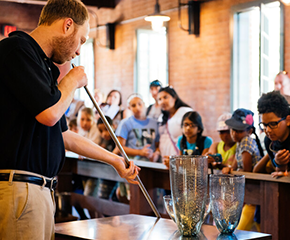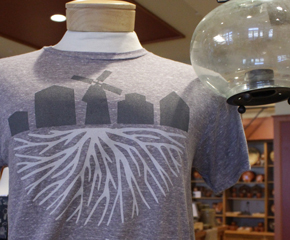
John Tjaarda Papers
The John Tjaarda papers include general and legal correspondence, clippings, photographs and a sketch book of designs. The bulk of the papers cover Tjaarda's work at Briggs Manufacturing Company and subsequent legal claims against Briggs and Chrysler Corporation over ownership of designs and patents.
Biographical / Historical Note
John Tjaarda, design engineer who influenced the automobile industry with his advanced, styling and engineering, was born 4 February 1897 in Arnheim, The Netherlands. After graduation from the Alexander Klemins School of Aeronautics in London, he joined...
MoreJohn Tjaarda, design engineer who influenced the automobile industry with his advanced, styling and engineering, was born 4 February 1897 in Arnheim, The Netherlands. After graduation from the Alexander Klemins School of Aeronautics in London, he joined the Royal Dutch Air Force.
In 1923 Tjaarda emigrated to the United States, obtained employment as a design assistant with Locke & Co. of Rochester, N.Y., an automobile manufacturer of bodies for Stutz, Pierce Arrow and Packard. During this time, he designed and built a prototype of a small, rear-engine automobile, the Sterkenburg, named after his family’s home in the Netherlands.
Impressed by his design ability, Walter O. Briggs, in 1932, hired Tjaarda to work in, and eventually head the design engineering division of the Briggs Manufacturing Company, of which the LeBaron division was a custom body subsidiary designing bodies for Ford, Packard and Chrysler. Tjaarda, encouraged by Edsel Ford, produced a full-size, fully detailed wood frame mockup of a rear- engine automobile. It was included in the 1933 Ford Exhibition of Progress in Detroit and in the Ford exhibit at the 1934 Chicago World’s Fair, A Century of Progress. This prototype was the basis for Tjaarda's most notable design, the 1936 Lincoln-Zephyr.
In 1941, a patent disagreement between Tjaarda and the officers of Briggs developed and Tjaarda's employment was abruptly terminated. Many years of legal battles followed. In 1942, Tjaarda organized his own design firm, John Tjaarda and Associates. Again, he attempted to design, finance and manufacture his own automobile, the Cortez. Due to lack of financing, he was not successful. Then, in 1961, pursuing an interest in solid state rocketry, he joined the Aerojet-General Corporation, Sacramento, CA as a technical adviser. His colorful life came to an end in 1962.
John Tjaarda's advanced work on unit-body construction and rear engine automobiles were important contributions to automotive design. His work had simplicity, refined design, and lightweight structural strength.
LessScope and Content Note
The collection contains legal correspondence, patent correspondence, general correspondence, newspaper/periodical articles, photographs, and a sketchbook. The majority of the correspondence concerns Tjaarda's legal battles with Briggs Manufacturing Company and Chrysler Corporation.
Collection Details
Object ID: 87.1.1714.1
Creator: van Starkenberg, Joop "Jan" Tjaarda, 1897-1962
Inclusive Dates: 1916-1962
Size: 0.8 cubic ft. and 1 oversize box
Language: English
Collection Access & Use
Item Location: Benson Ford Research Center
Access Restrictions: The papers are open for research.
Credit: From the Collections of The Henry Ford.
Related Objects
Digitized Artifacts From This Collection
In many cases, not all artifacts have been digitized.
Contact us for more information about this collection.
John Tjaarda, Automotive Designer, circa 1935
Artifact
Photographic print
Date Made
circa 1935
Summary
As head of the design engineering division of the Briggs Manufacturing Company, John Tjaarda designed automotive bodies for Ford, Packard, and Chrysler. Ford exhibited one of his mockups, a frame for a rear-engine automobile, at the 1934 Chicago World's Fair. The frame became the basis of his most notable design: the popular 1936 Lincoln-Zephyr.
Creators
Place of Creation
Keywords
Object ID
87.1.1714.7
Credit
From the Collections of The Henry Ford.
Location
By Request in the Benson Ford Research Center
Get more details in Digital Collections at:
John Tjaarda, Automotive Designer, circa 1935
What is The Henry Ford?
The national attraction for discovering your ingenuity while exploring America’s spirit of innovation. There is always much to see and do at The Henry Ford.
Prototype Lincoln Zephyr Automobile Designed by John Tjaarda, 1934
Artifact
Negative (Photograph)
Date Made
15 February 1934
Summary
Edsel Ford encouraged John Tjaarda -- head of design engineering for Briggs Manufacturing Company, which built car bodies for Lincoln -- to create a full-sized, detailed mockup of a rear-engine automobile. Ford exhibited the resulting car at the 1934 Century of Progress exposition in Chicago. Tjaarda's streamlined design became the prototype for the 1936 Lincoln Zephyr production car.
Keywords
Object ID
87.1.1714.6
Credit
From the Collections of The Henry Ford.
Location
By Request in the Benson Ford Research Center
Get more details in Digital Collections at:
Prototype Lincoln Zephyr Automobile Designed by John Tjaarda, 1934
What is The Henry Ford?
The national attraction for discovering your ingenuity while exploring America’s spirit of innovation. There is always much to see and do at The Henry Ford.
Lincoln Zephyr Prototype Automobile Body Designed by John Tjaarda, 1934
Artifact
Negative (Photograph)
Date Made
14 November 1934
Summary
Edsel Ford encouraged John Tjaarda -- head of design engineering for Briggs Manufacturing Company, which built car bodies for Lincoln -- to create a full-sized, detailed mockup of a rear-engine automobile. Ford exhibited the resulting car at the 1934 Century of Progress exposition in Chicago. Tjaarda's streamlined design became the prototype for the 1936 Lincoln Zephyr production car.
Keywords
Object ID
87.1.1714.5
Credit
From the Collections of The Henry Ford.
Location
By Request in the Benson Ford Research Center
Get more details in Digital Collections at:
Lincoln Zephyr Prototype Automobile Body Designed by John Tjaarda, 1934
What is The Henry Ford?
The national attraction for discovering your ingenuity while exploring America’s spirit of innovation. There is always much to see and do at The Henry Ford.






